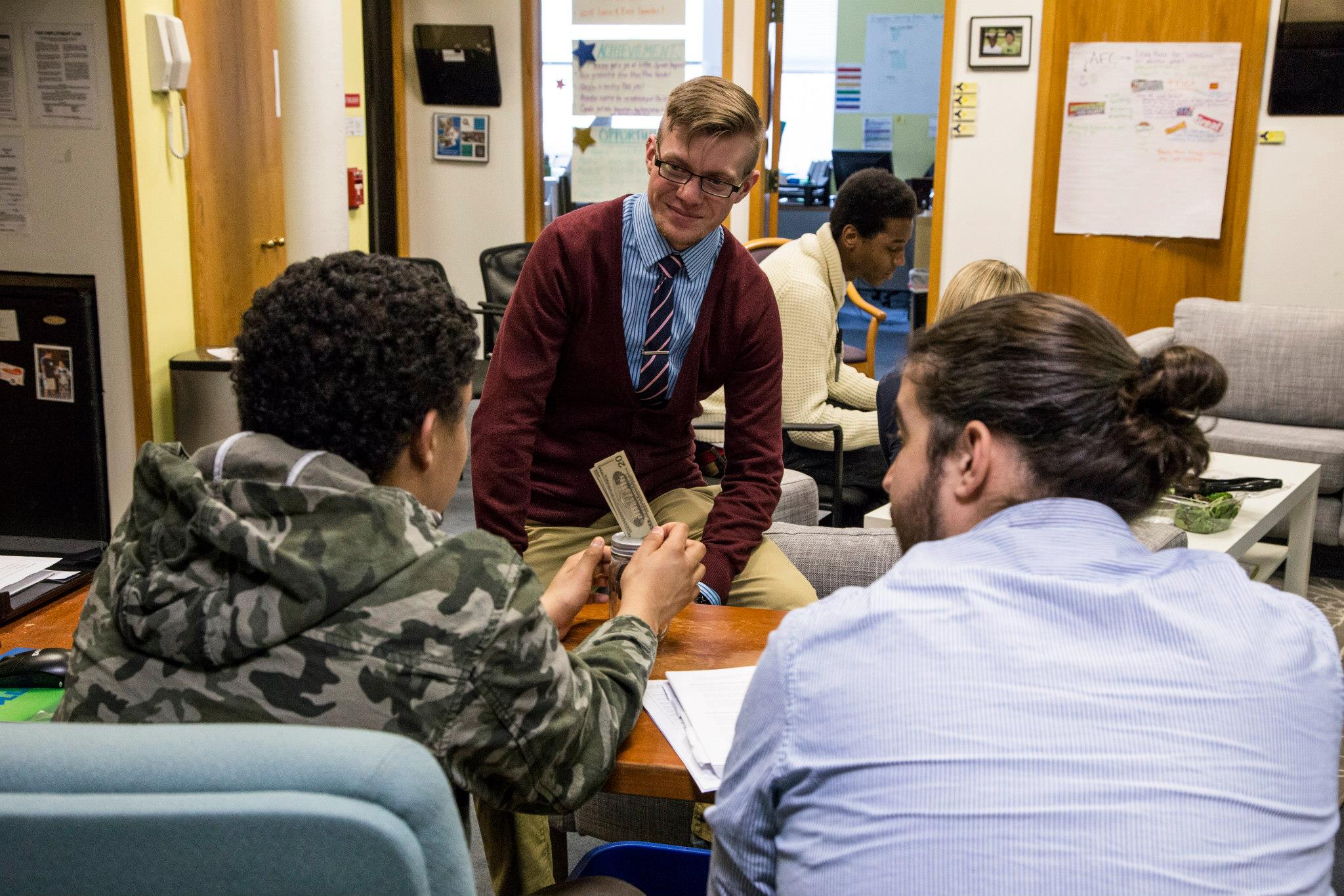
Silver Lining Mentoring Program Supervisor Evan works with teens in Learn & Earn.
It is 2012. Derek is a sophomore at Brighton High School, and his caseworker is concerned that he has no consistent, positive adult presence in his life. Furthering her concern is a lack of support surrounding Derek’s questions about his LGBTQ+ identity. She calls Silver Lining Mentoring because she knows they will understand Derek’s needs, even if she, doesn’t.
There are more than 1,500 young people in foster care in Greater Boston. After experiencing trauma in the home, young people often re-experience trauma at the hands of an underfunded foster care system that isn’t always equipped to meet their varied needs.
Youth in Foster Care Have Specific Needs
Youth can expect to move as many as five times while in foster care, and may move as often as once or twice every single year. With each move, young people can lose as much as four to six months of academic progress.1 Frequent changes in schools and communities also mean that youth in care are less likely to find natural mentors in their lives, like teachers or coaches.2
This experience of adversity combined with the absence of stable, committed adults in the lives of youth in foster care contribute to a higher risk for negative outcomes in adulthood: 20 percent are incarcerated within two years of leaving foster care; 20 percent will experience homelessness; and they are 30 percent less likely to earn a high school degree.3 The Casey Foundation found that approximately one-fourth of foster care alumni suffer from Post-Traumatic Stress Disorder (PTSD) -- double the rate of PTSD in U.S. combat veterans.4
Silver Lining pairs Derek with a mentor, Eve. They bond over a mutual love for the Boston Celtics. Eve attends Derek’s debate tournaments -- he says he never knew what it felt like to have someone in the audience to cheer him on before. Eve’s support makes all the difference for him.
Mentoring: Long-Term, Committed Relationships Make the Difference
Consistent, positive relationships are paramount to healthy development. Given the likelihood that youth in foster care have experienced both trauma and disrupted relationships, the introduction of stable relationships with caring adults has the potential to be transformative for these youth.5 Research shows that mentoring can have a positive effect on important life outcomes for youth, including reductions in poverty and improvements in healthy and positive behaviors.6 When applied to young people in foster care, the effects are most profound on their well-being, including improved health outcomes, fewer sexually transmitted infections,7 greater interest in education and activities that will help in future careers,8 and fewer problem behaviors.9
Having connected as members of the LGBTQ community adds to Eve and Derek’s bond. Derek comes out as transgender to SLM and Eve before anyone else. Eve attends his high school graduation. When, early one morning, Derek receives his college acceptance email, he counts the minutes until 7:00 am so he can share the news with Eve first.
How Silver Lining Mentoring is Meeting This Need in Boston
Silver Lining Mentoring empowers youth in foster care to flourish through committed mentoring relationships and the development of essential life skills. As the only mentoring organization in Massachusetts focused exclusively on the needs of youth in foster care, SLM is finding success through its unique approach.
Integrated Service Model
Silver Lining Mentoring leverages the power of positive relationships to provide youth with opportunities to build a sense of belonging and self-efficacy. Silver Lining meets the needs of youth in care through an integrated approach, at the core of which is a one-to-one mentoring relationship. Community Based Mentoring (CBM) pairs youth with a volunteer mentor for at least one year. Mentors are matched with the youth’s preferences in mind. Matches meet for a minimum of eight hours each month. Mentor selection and training is intensive, leading to a cadre of committed and highly qualified mentors. Learn & Earn is a life skills program for young adults that focuses on financial literacy and employment readiness. Participants are each matched with a volunteer mentor and earn money as they meet milestones throughout the 12-week “bootcamp.” SLM incentivizes the practice of saving money by matching youths’ savings. Youth are offered the chance to continue with their mentors to the CBM program, with the goal of working together for at least one year. Young Adult Services (YAS) is the support targeted at those who are on the cusp of or who have aged out of foster care, meaning the state no longer provides support (such as housing, food assistance, etc.) to the youth. YAS provides individualized clinical support, resource brokering, and housing support services, along with other critical, urgent needs. Participants can also engage in paid leadership opportunities.
In contrast to the fractured services that can characterize their time in foster care, SLM youth have the opportunity to access any of SLM’s services at any time. Importantly, no young person “ages out” of Silver Lining’s services. SLM prides itself on giving youth in foster care what they need, when they need it, for as long as they need it.
Clinically-Trained, Trauma-Informed and Culturally Responsive Support
In order to best support the needs of youth and mentors, Silver Lining’s program staff is comprised of clinically-trained social workers. These staff are well-prepared to work with youth in foster care; they have expertise in understanding youth behaviors and needs in the context of each individual’s history of abuse, neglect, and trauma. Masters-level clinicians implement evidence-based intervention methods that prolong youth engagement in SLM’s programs. Social workers provide one-to-one social and emotional support to youth, and serve as resource-brokers to external services as needed, such as mental health, vocational, or educational programs. Importantly, they also support mentors: in establishing a relationship with their mentees, when challenges arise, in celebrating milestones, and so on. Last year alone, Silver Lining Mentoring’s social workers provided more than 400 hours of intensive case management for young people and mentors.
Young people of color and those who identify as LGBTQ are overrepresented in foster care. Silver Lining Mentoring emphasizes mentor, staff, and board recruitment efforts that are explicitly directed at attracting people from a diversity of backgrounds. SLM also launched a program that seeks out and supports mentors and youth in foster care who identify as LGBTQ, providing youth with direct support from adults with similar identities, like Derek and Eve.
Human-Centered Design
Silver Lining bases its model of support entirely on the needs of its youth, and incorporates the voices of its young people when considering program changes. As an example of this responsiveness to youth needs, Silver Lining initially launched the Learn & Earn (L&E) program as a year-long series of workshops held at SLM’s downtown Boston office. Over time, SLM did not see anticipated gains, and post-program surveys of the youth indicated underlying challenges. As a result of the transience they experience, youth transportation from different locations over the course of a year proved to be a barrier to participation. Additionally, young people often had to choose between attending workshops and taking or keeping a job. Using youth feedback as a guide, SLM significantly shifted the L&E model. SLM partnered with child welfare service providers to offer mentoring and life skills workshops at partners’ residential facilities. The workshop frequency was condensed to a weekly, three-month bootcamp approach to allow youth who were transient to fully participate. SLM also began to pay youth for their successful completion of curriculum components. With this new model, SLM has seen far lower attrition rates: while the initial year-long cohort graduated only 17 percent of its members, cohorts in the current model are graduating more than 75 percent of their members. Additionally, more than 75 percent of youth remain connected with their mentors after the conclusion of the bootcamp, successfully transitioning to SLM’s Community-Based Mentoring program.
The Results
Infusing SLM’s programs and services with these tenets has meant that its mentoring relationships have met critical thresholds in consistency and longevity, resulting in improved long-term outcomes for youth. Generally, mentoring relationships must last at least one year to net positive results, and relationships lasting less than three months have a negative impact.10 More than 90 percent of SLM’s relationships meet the critical one-year milestone. Additionally, the average length of a mentoring relationship supported by SLM is 55 months, more than six times the national average of nine months.11 As a result, SLM youth, as compared to their peers nationally, are twice as likely to graduate from high school, three times as likely to be employed, and seven times as likely to matriculate to college.
Derek is now a full-time college student. With Eve’s support, he graduated from Learn & Earn, using his money to buy a laptop for school. Studying criminal justice, Derek hopes to attend law school. Eve remains his favorite person with whom to swap Celtics trade rumors. Their relationship has evolved, but the foundation of support he receives from Eve and SLM remains constant.
Works Cited
1. Jessica Leahy, “Every Time Foster Kids Move, They Lose Months of Academic Progress,” The Atlantic, February 24, 2017, accessed October 15, 2017.
2. Adrienne L. Fernandes, Youth Transitioning From Foster Care: Background, Federal Programs, and Issues for Congress, Congressional Research Service (CRS) Report for Congress, May 21, 2008, 1.
3. Madelyn Freundlich, Time for Reform: Aging Out and On Their Own, Pew Charitable Trusts, May 2007, 1-19.
4. P.J. Pecora, R.C. Kessler, et al, Improving Family Foster Care: Findings from the Northwest Foster Care Alumni Study, Casey Family Programs, March 14, 2005, 1.
5. Heather L. Storer, Susan E. Barkan, et al, “In search of connection: The foster youth and caregiver relationship,” Child Youth Serv Rev., 2014 Jul; 42: 110–117. Accessed October 15, 2017. doi: 10.1016/j.childyouth.2014.04.008.
6. Mary Bruce and John Bridgeland, The Mentoring Effect: Young People’s Perspectives on the Outcomes and Availability of Mentoring, Civic Enterprises with Hart Research Associates for MENTOR: The National Mentoring Partnership, January 2014, 2.
7. Kym R. Ahrens, MD, MPH, David Lane DuBois, PhD, et al, “Qualitative exploration of relationships with important non-parental adults in the lives of youth in foster care,” Child Youth Serv Rev. 2011 Jun 1; 33(6): 1012–1023, accessed October 15, 2017, doi: 10.1016/j.childyouth.2011.01.006.
8. EL Klaw, JE Rhodes, “Mentor relationships and the career development of pregnant and parenting African-AmDerekan teenagers,” Psychology of Women Quarterly. 1995 Dec; 19(4): 551-62.
9. Lisa M. Keating, Michelle A. Tomishima, Sharon Foster, Michael Alessandri, “The effects of a mentoring program on at-risk youth,” Adolescence. 2002 Winter; 37(148): 717-34.
10. Jean B. Grossman, Jean E Rhodes, “The Test of Time: Predictors and Effects of Duration in Youth Mentoring Relationships,” AmDerekan Journal of Community Psychology, 30 (2002): 199-206.
11. Jean Rhodes, David DuBois, Mentoring in AmDereka 2005: A Snapshot of the Current State of Mentoring, (MENTOR/National Mentoring Partnership, 2006).
Author Bio

Colby Swettberg, Ed.M, LSCW; CEO, Silver Lining Mentoring
Colby Swettberg
As a former educator, Colby Swettberg earned a Master’s Degree in Education from Harvard University and a Master’s degree in Social Work from the Simmons School of Social Work. Colby moved to Silver Lining Mentoring in 2009 after working at The Home for Little Wanderers for eight years where Colby oversaw a group home for LGBTQ teenagers, did clinical work in adoption and family stabilization team services, facilitated support groups for foster and adoptive families, and provided training and consultation nationwide on sexual orientation and gender identity issues. In 2012, Colby was given the “Angel in Adoption” award for her advocacy efforts on behalf of youth in foster care by Senator John Kerry. In October 2013, Youth Villages honored Colby with the “Women of Excellence” award for Colby’s service to young women in foster care. Most recently, Colby was named a 2017 Barr Foundation Fellow.


